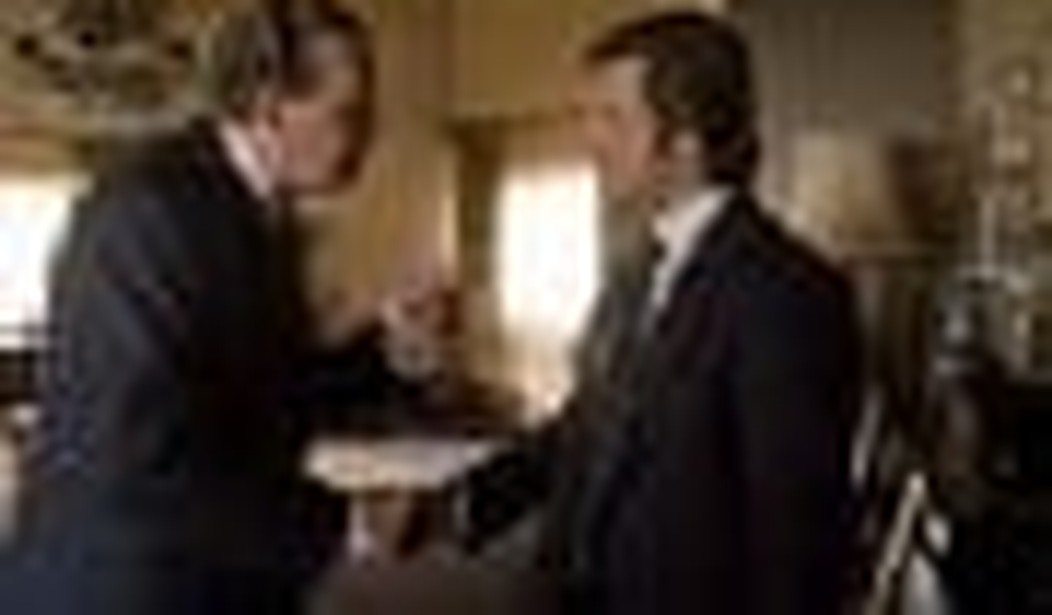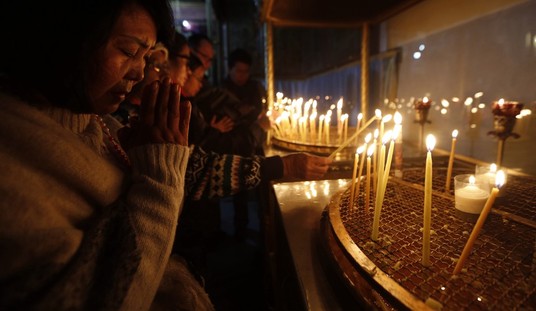The billing in Frost/Nixon says a lot about what kind of movie it is; a better title might have been, “I Interviewed an Ex-President for 29 Hours and All I Got Was Two Lousy Sound Bites.”
The movie, directed by Ron Howard from Peter Morgan’s play and screenplay, would have us believe that David Frost’s 1977 series of interviews with the disgraced 37th president (Frank Langella), who needed the money and charged $600,000 for the sit-down, was an epochal event or showdown or battle of wits. In reality, it was a TV show like many others, one that had more or less been forgotten before Morgan decided to give it the epic treatment.
Morgan and Howard go to some lengths to frame the story as a David slaying Goliath, defining Frost (Michael Sheen, who also played Tony Blair in The Queen, another Frost script) as a lightweight, a ladies’ man and a laughingstock known for hosting light entertainment shows and interviewing the Bee Gees. In reality, Frost was more of a Charlie Rose figure — he interviewed celebrities as well as newsmakers who appreciated being given the space to talk. Every journalist has covered his share of dumb stuff, because whatever people are talking about is what they have to cover.
The movie spends an hour building up to the interview by placing Frost in cramming sessions in which he hopes to learn how to give Nixon “the trial he never had.” In these scenes the movie is indeed a revelation, but what it makes brilliantly clear is that journalism is not what is happening. You might look at an interview as an opportunity to seek information, but that would be naïve of you.
What Frost wants — what virtually any journalist would want under the circumstances, and not to their credit — is to make Nixon look bad. Nixon already looked very bad indeed, and had been justly humiliated. As depicted in this movie, Frost wasn’t curious about the facts and had no interest in adding to what was known about Watergate. He believed he knew the facts and that he should use them to embarrass Nixon on camera, because that would win him adulation from other journalists, invitations to the best parties, the nuclear ego boost that comes with appearing on the cover of Time and Newsweek.
All of the hullabaloo Howard and Morgan construct around the interviews boils down to two sound bites: Nixon saying, “When the president does it, that means it’s not illegal,” and Nixon issuing the mildest imaginable sort of semi-apology when he owns up to having let down the American people. That this is a pretty meager harvest from 29 hours of talks over 12 days is overlooked in the film (“He went no further than he did in his resignation speech two and a half years ago,” the Washington Post ruled at the time). Instead, we are told that the look on Nixon’s face when he gave the so-called apology made for great television and a cathartic moment. Frost is presented as having knocked out the champ.
Actually, though, many of the most interesting things Nixon said came when the cameras weren’t rolling — when Frost wasn’t deploying the alleged brilliance of his supposedly heroic team of investigators (played by Oliver Platt and Sam Rockwell) but simply listening. In the film’s pivotal scene, a drunken Nixon calls Frost in his hotel room and makes the case that the two of them are kindred spirits who have always been counted out by the snobby elites. Later in the film, Nixon will swear he has no memory of the conversation, suggesting it was indeed a moment when he let the mask slip. The scene is plausible, but unfortunately for Morgan, and even more for us, it is fabricated. Morgan has justified the scene by likening it to similar moments in Nixon’s life, but in a supposedly fact-based film, that isn’t good enough. At another point, just as cameras are about to roll, Nixon asks his interlocutor, “Did you do any fornicating last night?” It’s a hilarious, quintessential moment.
Richard Nixon — a man who signed notes to his wife “RN” and was photographed walking the California beach in dress shoes — was a deeply strange personality whose disgust for his perceived enemies and perpetual aggrievement did have much to do with the many abuses of power we call Watergate. No movie before this one (certainly not Oliver Stone’s often cartoonish Nixon, which features one of Anthony Hopkins’ most mannered and least convincing performances) has come so close to getting him right. Langella’s performance has a whiff of the nightclub impersonator about it but it’s a much more balanced effort than the jerky, awkward Nixon that Hopkins delivered. Langella’s work occasionally even makes a bow to charm and charisma, traits not normally conceded a man who did, after all, carry 49 states in 1972. When the film puts aside the ultimately unimportant Frost and the even less interesting media circus around him to train its gaze on Nixon, it’s a compelling, even incisive character study.
Frost/Nixon
Directed by Ron Howard
Starring: Frank Langella, Michael Sheen, Oliver Platt, Sam Rockwell
3 stars/ 4
122 minutes/Rated R









Join the conversation as a VIP Member